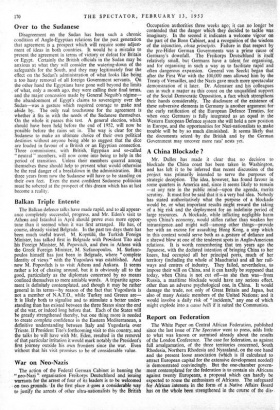A China Blockade ?
Mr. Dulles has made it clear that no decision to blockade the China coast has been taken in Washington, and has left it to be inferred that recent discussion of the project was primarily intended to serve the purposes of strategic deception. The idea, however, has found favour in some quarters in America and, since it seems likely to remain —at any rate in the public mind—upon - the agenda, merits scrutiny. It must first be said that it is a very bad idea. Nobody has stated authoritatively what the purpose of a blockade would be, or what important results might reward the taking of a big risk and the deployment for an indefinite period of large resources. A blockade, while inflicting negligible harm upon China's economy, would stiffen rather than weaken her intransigence andmight well=among other things—provide her with an excuse for assaulting Hong Kong, a step which in this context would serve both as a /gesture of defiance and a shrewd blow at one of the tenderest spots in Anglo-American relations. It is worth remembering that ten years ago the Japanese, with the declared intention of bringing China to her knees, had occupied all her principal ports, much of her territory (including the whole of Manchuria) and all her rail- ways and centres of industry. They failed, nevertheless, to impose their will on China, and it can hardly be supposed that today, when China is not cut off—as she then was—from Russia, a maritime blockade would have any serious effect, other than an adverse psychological one, in China. It would damage the trade, not only of Great Britain and Japan, but also of many Asiatic members of the United Nations; and it would involve a daily risk of " incidents," any one of which might explode into a cersus belli if it suited the Communists.


































 Previous page
Previous page